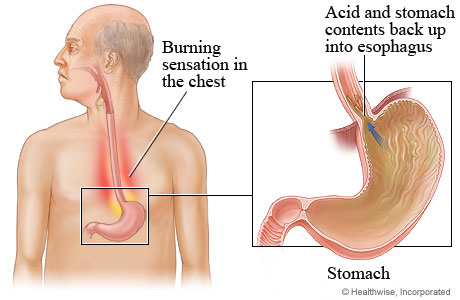Heartburn

Heartburn is a feeling of burning, warmth, heat, or pain that often starts in the upper abdomen just beneath the lower breastbone (sternum). This discomfort may spread in waves upward into your throat, and you may have a sour taste in your mouth.
How can you care for yourself when you have heartburn?
Home treatment, such as lifestyle changes and nonprescription medicines, may be all that's needed to treat heartburn. But if your symptoms don't get better with home treatment, or if your symptoms occur often, there may be other medical problems causing your symptoms.
Keep a record of your heartburn symptoms before and after you make lifestyle changes or use nonprescription medicines so you can track any improvement or changes.
Medicines to treat heartburn
The two main types of medicines for heartburn are antacids and stomach acid reducers.
Antacids
Many people take nonprescription antacids for mild or occasional heartburn.
- Antacids such as Tums, Mylanta, or Maalox neutralize some of the stomach acid. They work for 30 minutes to 2 hours, depending on whether the stomach is full or empty. Liquid or dissolving antacids usually work faster than tablet forms.
- Antacids such as Pepto-Bismol coat the esophagus and act as a barrier to reflux acid. Pepto-Bismol should not be used for more than 3 weeks. And you shouldn't take it if you can't take aspirin. It may make your tongue or stools black. The black color usually isn't serious. Brushing your teeth and tongue after you take Pepto-Bismol may keep your tongue from turning black.
Antacids work faster than acid reducers (H2 blockers). But their effect doesn't last more than 1 to 2 hours. H2 blockers can provide relief for up to 12 hours.
Antacids have side effects. They may cause diarrhea or constipation. And they can interfere with how your body absorbs other medicines.
Be careful when you take over-the-counter antacids. Many of these medicines have aspirin in them. Read the label to make sure that you aren't taking more than the recommended dose. Too much aspirin can be harmful.
Stomach acid reducers
- H2 blockers.
-
Histamine receptor (or H2) blockers decrease the amount of acid that the stomach makes. This may reduce irritation of the stomach lining and decrease heartburn. Some examples of nonprescription acid reducers are cimetidine (Tagamet HB) and famotidine (Pepcid AC).
- Proton pump inhibitors.
-
Proton pump inhibitors (PPIs), such as omeprazole (for example, Prilosec), reduce stomach acid. These acid-reducing medicines are used when your heartburn hasn't gotten better with other home treatments, antacids, or H2 blockers. You may need to use a PPI for up to 5 days before you have relief of your heartburn. You can buy PPIs without a prescription.
Cautions
- If you are pregnant and have heartburn symptoms, be sure to talk to your doctor before you take any heartburn medicines. Some medicines may not be safe to take while you are pregnant.
- If you use antacids more than just once in a while, talk with your doctor. If you have any health risks, be sure to talk with your doctor before you start to take an antacid. If you have kidney disease, it's even more important to discuss antacid use with your doctor. Regular use of antacids that contain magnesium or aluminum can cause a dangerous buildup of these two substances in people who have kidney disease.
- Talk with your doctor if you take an H2 blocker for more than 2 weeks.
- Acid reducers can sometimes change the way other medicines work. If you take prescription medicines, be sure to talk with your doctor before you take a nonprescription acid reducer.
©2011-2025 Healthwise, Incorporated
